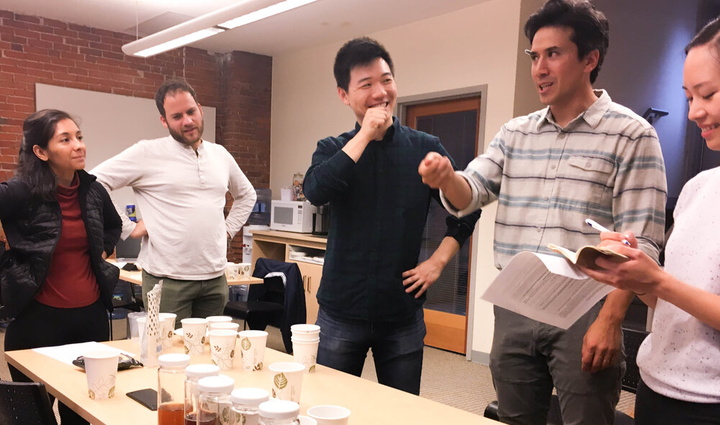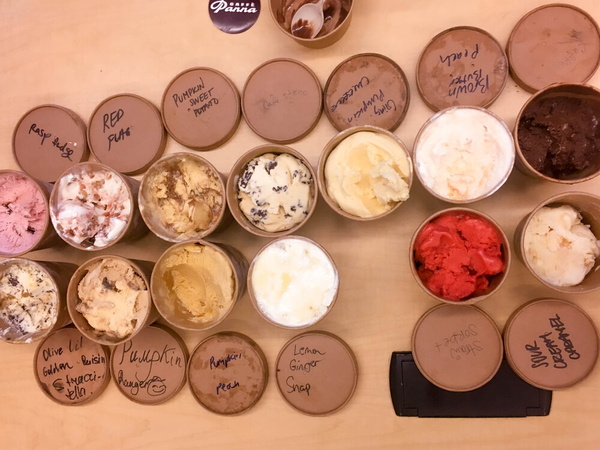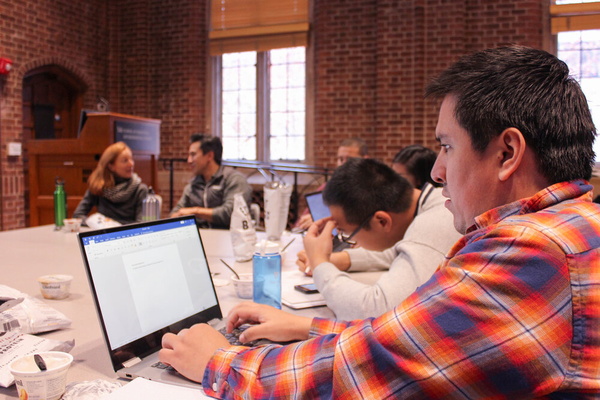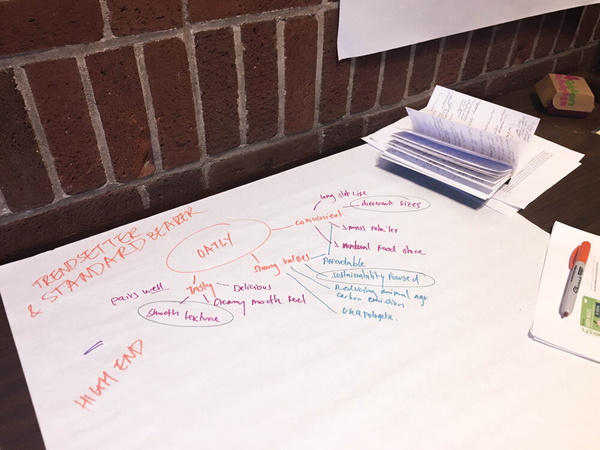From Bulletin Board to Grocery Store, Students Journey through the Food Product Development Process
“Pay attention to where your attention is going. Get in touch with your reptilian brain.” This peculiar set of instructions from Justin Freiberg, a mentor-in-residence at Tsai CITY and director of the Yale Landscape Lab, was not in reference to the neon green signs and LED lights that adorned Elm City Market on a gray October afternoon.
Rather, it was in reference to the grocery store’s even brighter collection of products, packages, and produce neatly arranged in rows, behind refrigerator doors, and on shelves — all carefully designed to reel in the casual market-goer.

From the dairy aisle to the snack section, under Freiberg’s instruction, a cohort of curious Yale students embarked on a scavenger hunt in the local market, kicking off the Food Product Development Intensive, one of the many programs offered by Tsai CITY this fall. Intensives are cohort-based, extracurricular learning opportunities that are exploratory and experimental in nature, and this Intensive exposed students with their own food product ideas to a diverse selection of industry experts and insights. Led by Freiberg and Erwin Li, a fellow at the Yale Sustainable Food Program, the Intensive would take its participants through a semester-long journey complete with taste-testing, open discussions, and activities.
Students by day and home cooks or aspiring entrepreneurs by night, the Intensive’s participants came to the program’s kickoff with their own recipes and ideas, ranging from twists on cultural foods, like a low-sugar kefir beverage or a quick-service empanada restaurant, to health-conscious or sustainability-focused products, like a cacao-based energy drink with roots in indigenous communities in Mexico, or even acorns as a flour or nut-milk. Equipped with diverse ideas, palates, and goals, the cohort would dive into one specific element of the development process in each session, starting with recipe development and storytelling and ending with marketing and manufacturing.
“This is graham crunch, my greatest achievement in life, and it’s all downhill from here.”

Before introducing herself, Hallie Meyer, a Yale College alum and the founder of newly-opened Caffe Panna, held up a plastic container packed with an enticing, sugary graham-cracker crumble. The homemade dessert condiment, however, was not without a fitting counterpart: ice cream. Cartons labeled with flavors like “Brown Butter Peach,” “Sour Cream Caramel,” and even “Olive Oil Golden Raisin Stracciatella” lay in front of her, undisturbed. But not for long.
The second session of the Intensive marked the first day dedicated entirely to learning from (and eating with) experts and entrepreneurs in the food business. Gathered around wooden tables, the cohort split into two breakout groups: one joined Meyer, scooping into her home-made ice cream, while another joined Jason Yang, Yale SOM alum and co-founder of Wildkind Foods, digging into his ready-to-serve plant-based meals.
As Meyer dished out advice on product sourcing and outreach, Yang took students through a simple costing exercise to help them better understand retailer markup, distribution, and production cost. The groups would eventually rotate and reconvene, but as the sound of discussion gradually replaced the sound of spoons scraping against paper bowls, it quickly became clear that Yang and Meyer had two different philosophies.
Yang established the importance of optimizing cost and targeting market tastes when starting a business, focusing on the economic realities of product development. However, Meyers noted that her ice cream business was “not targeting anyone.” Instead, she advised students to simply think about what they crave, what they enjoy eating — even if it’s a competitor's product — and apply their personal tastes to their own product.
“My goal in year one is to not make money — the goal in year one is to make it a beloved place to be and to create a culture,” she explained. “Once you build a community, there are so many ways to grow.”

In dialogue, Yang and Meyers provided the students with potentially conflicting pieces of advice: should they focus on their own personal tastes and values or the consumer’s? But perhaps the choice isn’t quite so stark. At the next session, Yale College alumnus Lucas Sin, culinary director at Junzi Kitchen, pointed out, “It’s not black and white, one and zero. You can engineer your product for your market while retaining authenticity.”
Like many of the students’ ideas, Sin’s business revolves around adapting a cultural item — in his case, traditional Chinese noodles — and transforming it into an experience that is both true to its roots and accessible. Flashes of Yang’s advice — adjusting to the market tastes and the western palate — appeared in Sin’s takes (“Beef stroganoff may taste good… but it doesn’t taste healthy,” he observed at one point), yet Sin also maintained his personal vision of Chinese-American cuisine. “Chinese food hasn’t been updated for a while,” he said. “It’s not just about refreshing what’s already there.”
Finding this balance of cost, cultural authenticity, and personal values was among the many challenges posed to the cohort over the course of the Intensive — not to mention other issues like sustainability, food ethics, and making connections within the sprawling food industry. With unanswered questions and loose ends swirling within the cohort as the Intensive moved into its final two sessions, students completed activities that could help move them towards the final stages of the development process.
To help solidify product messaging, Avi Szapiro of New Haven restaurant Roia helped students create a “mind map,” a colorful web diagram that included values like taste, convenience, and affordability. Herb Heller of Living Intentions asked students to give him a two-minute elevator pitch of their product, and reminded them to “always have your product on you.” Rachel Laryea, a current Yale PhD student and founder of Kelewele, took students through a storytelling exercise based on her personal exploration of plantains, a cultural food of her childhood. Meryl Breidbart, a current student at the Yale School of Management and co-founder of Chirps (a company that incorporates crickets in their chips, protein powder, and cookies), tasked students with crafting their own brand positioning statements alongside a template.

After students funneled their questions into tangible messages and began to outline bite-sized stories and values, Breidbart imparted the students with a final word of advice:
“When enough people are telling you that they think what you’re doing is crazy, you know you’re onto something.”
At the start of the Intensive, Tiffany Leong, a first-year student at SOM, brought in a homemade beverage using jujubes, a traditional Chinese superfood. By the end, she had created two additional recipes: a drink made with chrysanthemum tea, and another with hawthorne berries. Daniela Chona, a second-year SOM student, who began by experimenting with plain homemade kefir, now had formulated chai and chocolate syrups that alter the flavor profile of the original sour, fermented beverage. Schuyler Borden, a second-year FES student, who explored the culinary use of acorns throughout the Intensive, discovered that the oils of boiled, deshelled acorns actually give off a strong, toffee-like scent on their own.
“Getting feedback on the taste of my product from people with different perspectives on the product was so valuable,” Chona said. “I was constantly surprised by the different interpretations — and positive reactions — to the kefir flavors I have been working on.…There was so much great content that I want to take some time to digest it all — no pun intended.”
Tony Cisneros, a student at SOM and FES, whose idea is a vegan, dehydrated meal company geared towards backpackers and hikers, added: “The Intensive has been so helpful as I flesh out my food product venture…I think we have reached a turning point where [we are] shifting focus to developing our brand.”
As the clocked ticked towards 4:30 on a November afternoon, signaling the conclusion of the Intensive, the participants gave each other’s newly refined and altered products one last taste and shared a final reflection with the group. While some praised each other’s support and feedback, thanked Freiberg and Li for organizing the Intensive, or commented on the insights from the speakers, Borden took the cohort back to the Intensive’s very beginning.
“The Intensive really changed my perspective,” he reflected. “When I go in a grocery store now and see every little brand, I think, ‘Someone had to go through that entire process to be on a shelf!’”